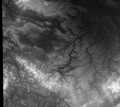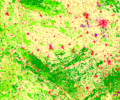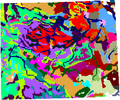GRASS-HRU/Tutorial
ChristianS (Talk | contribs) (→Free input data) |
ChristianS (Talk | contribs) (→Free input data) |
||
| Line 1: | Line 1: | ||
== Free input data == | == Free input data == | ||
<gallery> | <gallery> | ||
| − | File:SRTM_dem.png|SRTM Elevation | + | File:SRTM_dem.png|SRTM Elevation'' (EPSG:4326 - WGS84)'' |
| − | File:Corine_landcover.png|Corine Landcover | + | File:Corine_landcover.png|Corine Landcover ''(EPSG:3035 - ETRS89)'' |
| − | File:HWSD_soil.png|Harmonized World Soil Database | + | File:HWSD_soil.png|Harmonized World Soil Database ''(EPSG:4326 - WGS84)'' |
File:Pegel.png|HNZ Gauging stations | File:Pegel.png|HNZ Gauging stations | ||
</gallery> | </gallery> | ||
Revision as of 08:27, 26 March 2013
Contents |
Free input data
SRTM elevation
Corine Landcover
Download the CLC 2006 - 100m dataset from http://www.eea.europa.eu/data-and-maps/data/corine-land-cover-2006-raster-2. The resulting GeoTiff file you can load into QGIS. Use Raster > Extraction > Clipper to cut in advance. Extent coordinates of x1:4311011.14124, y1:3172437.46652, x2:4508461.13837 and y2:3009522.44988 would be a good choice in order to keep the area of Thuringia. At the end, reproject to the target spatial refernce system (Raster > Projections > Warp) - in our case EPSG:32632 (WGS84/UTM zone 32N).
Result: tbd
Harmonized World Soil Database
HNZ Gauging stations
Search http://hnz.tlug-jena.de/aktuelle-situation/thueringen.html for gauging stations Rappelsdorf and Hinternah and create a simple text file that contains at least the station coordinates and a whole-number identfier. A header line is advised:
id, name, lat, long 42151, Rappelsdorf, 50.49646395, 10.72495857 42160, Hinternah, 50.51864038, 10.79306017
Using Layer > Add delimited text layer in QGIS, you can easily import the stations as a layer and convert it into a Shapefile as required by GRASS-HRU: Right-click on imported layer and save it to a new Shapefile. Do not forget to specify the desired target coordinate reference system, here EPSG:32632 (WGS84/UTM zone 32N).
Result: tbd



